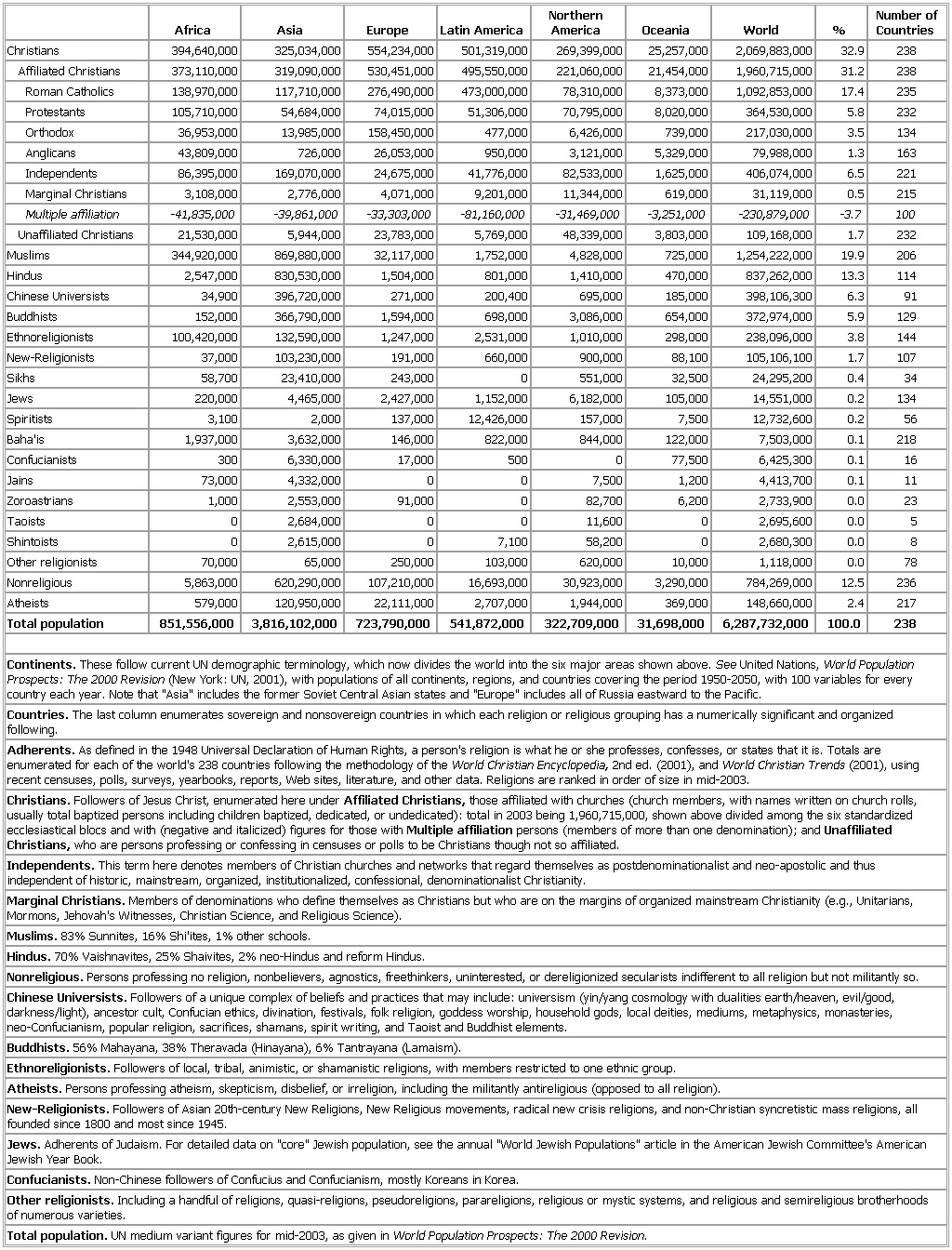- Worldwide Adherents of All Religions by Six Continental Areas, Mid-2003
-
▪ TableCountriesChristians 394,640,000 325,034,000 554,234,000 501,319,000 269,399,000 25,257,000 2,069,883,000 32.9 238Affiliated Christians 373,110,000 319,090,000 530,451,000 495,550,000 221,060,000 21,454,000 1,960,715,000 31.2 238Roman Catholics 138,970,000 117,710,000 276,490,000 473,000,000 78,310,000 8,373,000 1,092,853,000 17.4 235Protestants 105,710,000 54,684,000 74,015,000 51,306,000 70,795,000 8,020,000 364,530,000 5.8 232Orthodox 36,953,000 13,985,000 158,450,000 477,000 6,426,000 739,000 217,030,000 3.5 134Anglicans 43,809,000 726,000 26,053,000 950,000 3,121,000 5,329,000 79,988,000 1.3 163Independents 86,395,000 169,070,000 24,675,000 41,776,000 82,533,000 1,625,000 406,074,000 6.5 221Marginal Christians 3,108,000 2,776,000 4,071,000 9,201,000 11,344,000 619,000 31,119,000 0.5 215Multiple affiliation -41,835,000 -39,861,000 -33,303,000 -81,160,000 -31,469,000 -3,251,000 -230,879,000 -3.7 100Unaffiliated Christians 21,530,000 5,944,000 23,783,000 5,769,000 48,339,000 3,803,000 109,168,000 1.7 232Muslims 344,920,000 869,880,000 32,117,000 1,752,000 4,828,000 725,000 1,254,222,000 19.9 206Hindus 2,547,000 830,530,000 1,504,000 801,000 1,410,000 470,000 837,262,000 13.3 114Chinese Universists 34,900 396,720,000 271,000 200,400 695,000 185,000 398,106,300 6.3 91Buddhists 152,000 366,790,000 1,594,000 698,000 3,086,000 654,000 372,974,000 5.9 129Ethnoreligionists 100,420,000 132,590,000 1,247,000 2,531,000 1,010,000 298,000 238,096,000 3.8 144New-Religionists 37,000 103,230,000 191,000 660,000 900,000 88,100 105,106,100 1.7 107Sikhs 58,700 23,410,000 243,000 0 551,000 32,500 24,295,200 0.4 34Jews 220,000 4,465,000 2,427,000 1,152,000 6,182,000 105,000 14,551,000 0.2 134Spiritists 3,100 2,000 137,000 12,426,000 157,000 7,500 12,732,600 0.2 56Baha'is 1,937,000 3,632,000 146,000 822,000 844,000 122,000 7,503,000 0.1 218Confucianists 300 6,330,000 17,000 500 0 77,500 6,425,300 0.1 16Jains 73,000 4,332,000 0 0 7,500 1,200 4,413,700 0.1 11Zoroastrians 1,000 2,553,000 91,000 0 82,700 6,200 2,733,900 0.0 23Taoists 0 2,684,000 0 0 11,600 0 2,695,600 0.0 5Shintoists 0 2,615,000 0 7,100 58,200 0 2,680,300 0.0 8Other religionists 70,000 65,000 250,000 103,000 620,000 10,000 1,118,000 0.0 78Nonreligious 5,863,000 620,290,000 107,210,000 16,693,000 30,923,000 3,290,000 784,269,000 12.5 236Atheists 579,000 120,950,000 22,111,000 2,707,000 1,944,000 369,000 148,660,000 2.4 217Total population 851,556,000 3,816,102,000 723,790,000 541,872,000 322,709,000 31,698,000 6,287,732,000 100.0 238Continents. These follow current UN demographic terminology, which now divides the world into the six major areas shown above. See United Nations, World Population Prospects: The 2000 Revision (New York: UN, 2001), with populations of all continents, regions, and countries covering the period 1950-2050, with 100 variables for every country each year. Note that "Asia" includes the former Soviet Central Asian states and "Europe" includes all of Russia eastward to the Pacific.Countries. The last column enumerates sovereign and nonsovereign countries in which each religion or religious grouping has a numerically significant and organized following.Adherents. As defined in the 1948 Universal Declaration of Human Rights, a person's religion is what he or she professes, confesses, or states that it is. Totals are enumerated for each of the world's 238 countries following the methodology of the World Christian Encyclopedia, 2nd ed. (2001), and World Christian Trends (2001), using recent censuses, polls, surveys, yearbooks, reports, Web sites, literature, and other data. Religions are ranked in order of size in mid-2003.Christians. Followers of Jesus Christ, enumerated here under Affiliated Christians, those affiliated with churches (church members, with names written on church rolls, usually total baptized persons including children baptized, dedicated, or undedicated): total in 2003 being 1,960,715,000, shown above divided among the six standardized ecclesiastical blocs and with (negative and italicized) figures for those with Multiple affiliation persons (members of more than one denomination); and Unaffiliated Christians, who are persons professing or confessing in censuses or polls to be Christians though not so affiliated.Independents. This term here denotes members of Christian churches and networks that regard themselves as postdenominationalist and neo-apostolic and thus independent of historic, mainstream, organized, institutionalized, confessional, denominationalist Christianity.Marginal Christians. Members of denominations who define themselves as Christians but who are on the margins of organized mainstream Christianity (e.g., Unitarians, Mormons, Jehovah's Witnesses, Christian Science, and Religious Science).Muslims. 83% Sunnites, 16% Shi'ites, 1% other schools.Nonreligious. Persons professing no religion, nonbelievers, agnostics, freethinkers, uninterested, or dereligionized secularists indifferent to all religion but not militantly so.Chinese Universists. Followers of a unique complex of beliefs and practices that may include: universism (yin/yang cosmology with dualities earth/heaven, evil/good, darkness/light), ancestor cult, Confucian ethics, divination, festivals, folk religion, goddess worship, household gods, local deities, mediums, metaphysics, monasteries, neo-Confucianism, popular religion, sacrifices, shamans, spirit writing, and Taoist and Buddhist elements.Ethnoreligionists. Followers of local, tribal, animistic, or shamanistic religions, with members restricted to one ethnic group.Atheists. Persons professing atheism, skepticism, disbelief, or irreligion, including the militantly antireligious (opposed to all religion).New-Religionists. Followers of Asian 20th-century New Religions, New Religious movements, radical new crisis religions, and non-Christian syncretistic mass religions, all founded since 1800 and most since 1945.Jews. Adherents of Judaism. For detailed data on "core" Jewish population, see the annual "World Jewish Populations" article in the American Jewish Committee's American Jewish Year Book.Confucianists. Non-Chinese followers of Confucius and Confucianism, mostly Koreans in Korea.Other religionists. Including a handful of religions, quasi-religions, pseudoreligions, parareligions, religious or mystic systems, and religious and semireligious brotherhoods of numerous varieties.Total population. UN medium variant figures for mid-2003, as given in World Population Prospects: The 2000 Revision.See as table:

* * *
Universalium. 2010.
